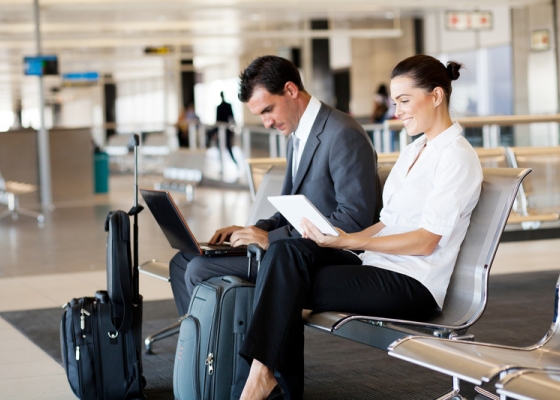
Traveling for work comes with unique challenges and responsibilities. Ensuring safety during trips is essential to maintaining productivity and minimizing risks. With effective business travel management practices and reliable online travel booking platforms, companies can safeguard employees and streamline their journeys.
This blog outlines essential safety tips for business travelers, and strategies businesses can adopt to prioritize safety. By understanding potential risks, leveraging technology, and following best practices, companies can create a secure environment for their employees, ensuring successful and stress-free corporate travel experiences. Read on to explore key steps for enhancing safety during business trips.
Comprehensive Safety Tips for Business Travelers
Pre-Trip Preparations
- Research the Destination
Understanding the location is critical to avoiding risks. Research local laws, cultural practices, and safety concerns. Travelers should be aware of potential hazards, common scams, and areas to avoid.
- Use Trusted Travel Platforms
Secure online travel booking platforms streamline trip planning while providing up-to-date information about destinations. These platforms often include built-in safety features such as emergency contacts and hotel ratings.
- Create an Itinerary
A detailed itinerary helps travelers stay organized. Include flight details, hotel reservations, meeting schedules, and transportation plans. For added accountability, share the itinerary with a designated person in your company.
- Understand Company Policies
Familiarize yourself with your company’s travel guidelines. These include emergency procedures, insurance details, and approved vendors for business travel management.
Essential Packing Tips
- Pack a Travel Safety Kit
Include items like a first-aid kit, a backup phone charger, and copies of essential documents. Travelers should also carry identification and emergency contact information.
- Minimize Valuables
Avoid carrying excessive cash or expensive items. Rely on secure payment methods, like corporate cards, and store valuables in a safe place during the trip.
- Prepare for Communication Challenges
Ensure your phone works internationally if traveling abroad. Download offline maps, translation tools, and local emergency contact apps before departure.
Health and Wellness Precautions
- Stay Vaccinated
Ensure vaccinations are up to date based on the destination’s requirements. Check for any mandatory health documents needed during travel.
- Maintain Hygiene
Practice hygiene to prevent illness during trips. Pack sanitizers and tissues and avoid consuming food from unreliable sources.
- Take Breaks to Rest
Business trips can be exhausting. Schedule enough rest to stay alert and maintain productivity. This aligns with effective business travel management.
Safety While Traveling
- Verify Transport Providers
Use licensed and reliable transportation services. When using ridesharing apps, verify driver details and share your ride status with a colleague or friend.
- Stay Alert in Public Spaces
Avoid disclosing sensitive information or leaving belongings unattended. Be cautious in high-traffic areas like airports, train stations, and cafes.
- Secure Accommodation
Select accommodations through trusted online travel booking platforms. Look for hotels with solid security measures, such as surveillance systems and safe entry points.
Security During Business Meetings
- Protect Personal and Company Data
Avoid connecting to public Wi-Fi networks without a virtual private network (VPN). Keep devices password-protected and encrypted.
- Secure Work Documents
Safeguard documents by carrying them in tamper-proof folders or secure digital formats. Be mindful of your surroundings when reviewing sensitive materials.
- Vet Meeting Locations
Arrange meetings in secure locations, such as hotel conference rooms or office spaces. Avoid discussing confidential topics in public areas.
Emergency Preparedness
- Keep Emergency Contacts Handy
Store local emergency numbers and embassy contact information. Include your company’s emergency response team in this list.
- Have a Contingency Plan
Prepare for disruptions like delayed flights, cancellations, or lost items. This is where a robust business travel management system can provide alternate solutions.
- Know Evacuation Procedures
Familiarize yourself with emergency exits in hotels and offices. Understand the evacuation plans for your destination.
Leveraging Technology for Travel Safety
- Use Corporate Travel Apps
Travel management apps enhance safety by offering real-time updates, emergency alerts, and itinerary tracking. They integrate seamlessly with online travel booking platforms.
- Track Locations
Companies should use tracking tools to monitor employee locations during trips. This ensures quick response during emergencies.
- Utilize Expense Tracking Tools
Monitor spending through digital tools to prevent overspending or fraud. These tools often come with built-in compliance checks.
Best Practices for Employers
- Provide Safety Training
Offer pre-trip safety training to employees. Topics should include cultural awareness, risk assessment, and emergency response.
- Ensure Comprehensive Insurance
Opt for travel insurance that covers medical emergencies, trip cancellations, and lost items. Include coverage for natural disasters or political unrest.
- Regularly Update Policies
Review and update travel policies to reflect current safety standards. Use feedback from employees to identify gaps and improve processes.
Ensuring Safety Through Smart Practices
Corporate travel safety hinges on effective planning, situational awareness, and access to reliable tools. Businesses are responsible for safeguarding their employees during trips by creating robust strategies that address potential risks. Implementing business travel management practices helps organizations establish clear protocols and ensure travelers are well-prepared for any challenges they may face. This includes offering safety training, maintaining comprehensive insurance policies, and utilizing secure platforms to manage bookings and itineraries.
Leveraging technology, such as online travel booking tools, is critical in modern corporate travel. These platforms provide real-time updates, detailed destination insights, and emergency response features that enhance traveler safety. Employers can further protect their teams by monitoring trip progress through tracking tools, enabling quick responses to unexpected events.
Educating employees on cultural awareness, data security, and emergency procedures ensures they remain vigilant and capable of handling disruptions. Preparing for contingencies, such as flight delays or cancellations, allows for seamless adaptations to changing circumstances.
Ultimately, fostering a culture of safety prioritizes both the well-being of employees and the success of corporate missions. By combining preparation, technology, and education, businesses can create an environment where travel is productive and secure, laying the groundwork for sustainable and efficient travel management.






















